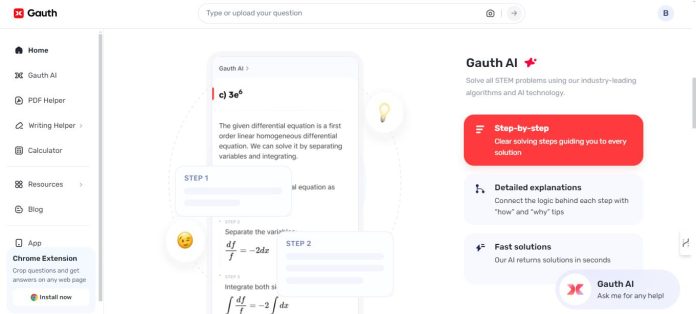Changing occupations may be exhilarating as well as frightening. Writing a solid personal statement that captures your path, goals, and fresh direction is one of the most essential elements of a successful change. Whether you are changing positions or sectors, a well-written personal statement helps academic institutions or companies know your credentials and goals. If you find it difficult where to start, a personal statement writer online may help to streamline the process. Platforms like Gauth provide a customized experience to assist you in creating a convincing case for your job shift by creating statements that differentiate you.
Every phrase in your statement matters when you are changing jobs. The online personal statement writer Gauth is meant to meet your demands especially. It provides guided questions, customizing, and professional comments to guarantee your statement is polished and businesslike. When you change your job, Gauth helps you effectively communicate your reasons and display transferable skills—qualities absolutely vital. Its unique qualities, like tailored advice and instantaneous comments, help you to clearly present your narrative.
Guidelines for Composing a Personal Statement for a Change of Direction in Your Career
Remember that your statement serves to relate your prior experiences with your future objectives before delving into the specifics. Key actions here will enable you to reach that:
Beginning with an Open Statement
Start by outlining the reasons you are looking for a job change. Although you should wait to go into great depth, a brief introduction prepares your assertion for later on. Emphasize your excitement for the shift, how your experiences have impacted your choice, and your love for the new professional path.
Emphasize Transmissible Skills
Lack of direct knowledge in the new industry is one of the main issues companies face when recruiting job changers. Emphasize the abilities you developed in your prior or present jobs that will help you in the future. Among these abilities are those of communication, leadership, problem-solving, and flexibility. If you have been a teacher but are moving into HR, you may highlight your time management and dispute resolution skills.
Describe Your Driving Force for Changing Your Career
Academic boards and companies alike want to hear why you’re switching. Share clearly the factors influencing your choice. Did your passion lie elsewhere? Are you looking for a more challenging or satisfying job? Maybe you discovered fresh information that piques your curiosity in another vocation. This part is essential as it shows your dedication to the transformation.
Add Any Appropriate Education or Training
This is the ideal venue to discuss courses, qualifications, or workshop attendance pertinent to your new employment. This indicates that you not only take the change seriously but also are actively getting ready to succeed in your new post.
Conclude with Confidence and Enthusiasm
End your statement on a positive note by reaffirming your excitement for the career change and your belief that you are well-suited for the new path. Employers and academic institutions value candidates who are confident, self-aware, and enthusiastic about their future.
Conclusion
Switching careers can feel overwhelming, but with a structured approach, you can craft a personal statement that highlights your strengths and commitment. For those looking for guidance, using a service like Gauth Personal Statement Writer online is a smart move. It helps to align your experiences with your future goals and tailor your statement to resonate with employers or admission boards.









